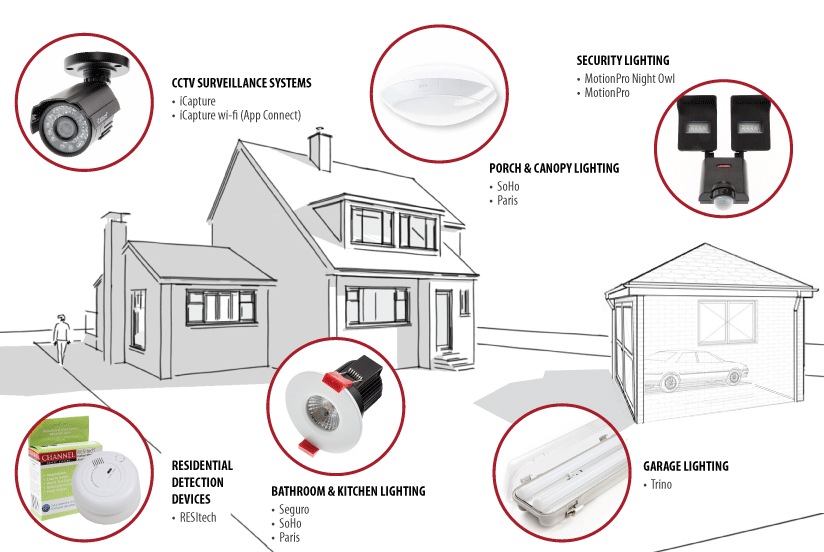
Keeping your residential property safe and secure can save you heartache and unnecessary paperwork with insurance claims and police reports. Residential property safety and security is often over looked as we think ‘It will never happen to us’. Even though crime rates and home fire reports suggest burglaries/theft and fires in the home are on the decrease, it is always best to ensure your property is not an easy target and is protected as well as it can be by ensuring suitable security and safety fire detection systems are in place.
How safe & secure is your home and how obvious is your security to potential burglars?
‘Homes with no security measures in place are five times more likely to be burgled than those with simple security measures’ (police.uk)
- Are there visible locks on windows and doors?
- Do you have security lighting or CCTV outside?
- Do you leave windows and doors open, making your property easily accessible?
- Are sheds and garages locked with high quality padlocks and security locks? Do you have high value goods stored inside?
- Do you have a spare key hidden in obvious places or is easily
- visible?
- Do you have step ladders or any other equipment lying around that may provide easy access into your home?
- Is it obvious when you are away from home or on holiday?
- Do you have a smoke alarm/detection device installed?
Burglars will often scope out properties before attempting a break in, if you can address some of the issues above by installing security lighting, CCTV surveillance, porch and canopy lighting and good internal lighting to your property it will become one of the less attractive houses to burgle.
At Channel we produce a range of high quality products to ensure the safety and security of your home, our products can be found by a number of our stockists which can be found here
CCTV surveillance
Acts as an increased deterrent to potential thieves and burglars — once CCTV has been spotted on your property the culprit will usually go elsewhere
Security lighting
Increases safety around your property and acts as a deterrent to thieves and vandals. Low level lighting distributed throughout your grounds will suffice with additional lighting fixtures dispersed strategically around your home.
Porch /canopy and garage lighting
Additional automatic lighting on your porch/canopy or garage will deter burglars as they will not want to trigger the light activation and be seen.
Bathroom lights & kitchen lights
Lights fitted in the bathroom or kitchen should be IP rated to ensure safety.
- Bathroom lights; should be IP44 but t to be even safer you can use IP65 rated products (protects against water ingress)
- Kitchen lights; should be IP20 but depending on the amount of steam generation to air on the side of caution fittings with a higher IP rating can be used.
A great deal of standard off the shelf solutions do not carry the correct IP rating and as such will not be signed off by a qualified electrician if you require a condition and/or periodic report on your property.
When it comes to protecting your home and family from potential fires it is a good idea to install detection devices to provide you with an early warning and ensure you and your family are evacuated from the property quickly and with limited risk and exposure.
Residential detection devices
Keep your home safe with a number of safety detection devices for your home — heat detectors, optical smoke detectors, ionisation smoke detectors and CO detectors.
- Optical smoke detectors are ideal systems for living rooms, dining rooms, landings and hallways and are more effective at detecting smouldering fires caused mainly by cigarette burns to upholstery or bedding.
- Heat detectors should be used where normal smoke detection might result in nuisance alarms due to high levels of smoke, fumes or dust and are ideal for bathrooms, basements, boiler rooms, attics and garages.
- Ionisation smoke detectors are designed for bedrooms and are more effective at detecting flaming fires of highly flammable materials
- CO detectors should be placed in kitchens, utility rooms, boiler rooms and next to solid fuel burners the CO detector is a legal requirement to install a carbon monoxide detector adjacent to any newly installed solid fuel appliance.

